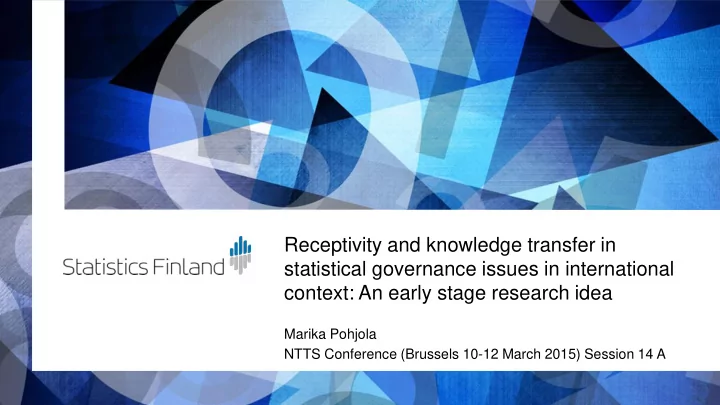

Receptivity and knowledge transfer in statistical governance issues in international context: An early stage research idea Marika Pohjola NTTS Conference (Brussels 10-12 March 2015) Session 14 A
The research issue How is receptivity reflected in knowledge transfer processes in the EU / ESS - African Statistical Charter Signatory Country Co-operation as concerns monitoring and evaluation mechanisms of implementation of the UN Fundamental principles of official statistics ?
Starting points Sharing of experiences, lesson-drawing, and promotion of good practices takes place in global statistics expert networks ”Soft “contents of transfer (norms and knowledge) vs. “hard” transfers (policy tools and practices; standards and methodologies) “Statistical governance issues”: reference frameworks for monitoring and evaluation • In the ESS the process includes self-assessments, peer reviews and improvement action plans • <> the broader statistical governance framework which encompasses i.a. relevant legislation Processes of knowledge transfer can be studied when concepts are emerging and policies being formulated
Outlined analytical approach Focus of attention is on statistics expert network actors in the ESS – the African Statistical Charter Signatory Country Co-operation, in project and programme level. Cognitions, motivations, and resources are defined as the actor core characteristics. These are influenced by the case-specific context, the structural governance context and a less specified wider context (i.a culture, economic and technical developments, political system) (The Contextual Interaction Theory (CIT) by H. Bressers (2013)) Perceptions, attitudes and agendas for change concerning instrument / tool logic, mechanism & calibrations and integration of monitoring and evaluation reference frameworks into main stream policies are studied. Focusing on nature of processes rather than on ultimate results.
Receptivity “Receptivity” is suggested to be a key capability, and goes both ways Awareness (information search), assessment, acquisition and application Receptivity is dependent on the way new information can be associated and exploited around existing knowledge, activities and objectives. • New actors (“external change agents”) may introduce new problem perceptions, propose new instruments and tools; new responsibilities to the existing context • Creating synergy with existing elements and structures is generally aimed at. (The Contextual Interaction Theory (CIT) by H. Bressers (2013))
Research strategy, methods, results A small- N case study approach Using mixed-methods approach, valuing both objective and subjective knowledge, applying quantitative & qualitative research methods Case-selection, research design, data collection, analytical and interpretative issues The analysis aims to describe collective experiences and various differences Cognitive mapping contributes also towards greater conceptual clarity and technical specificity in statistical governance issues in the efforts of ensuring the integrity of statistical systems.
Thank you Marika Pohjola (marika.pohjola@stat.fi)
References Bressers, Hans. In: Water Governance, Policy and Knowledge Transfer. International Studies on Contextual Water Management, Routledge, 2013. Howlett, Michael and Cashore, Benjamin. The Dependent Variable Problem in the Study of Policy Change: Understanding Policy Change as a Methodological Problem. Journal of Comparative Policy Analysis: Research and Practice 2009, Vol. 11, No 1. Jeffrey, P. and Seaton, R.A.F. A Conceptual Model of ‘Receptivity’ Applied to the Design and Deployment of Water Policy Mechanisms. Environmental Sciences 2004, Vol. 1, No. 3. Mossberger, Karin and Wolman, Harold. Policy transfer as a form of prospective policy evaluation: Challenges and recommendations. Public Administration Review 2003, Vol 63., No,. 4.
Recommend
More recommend